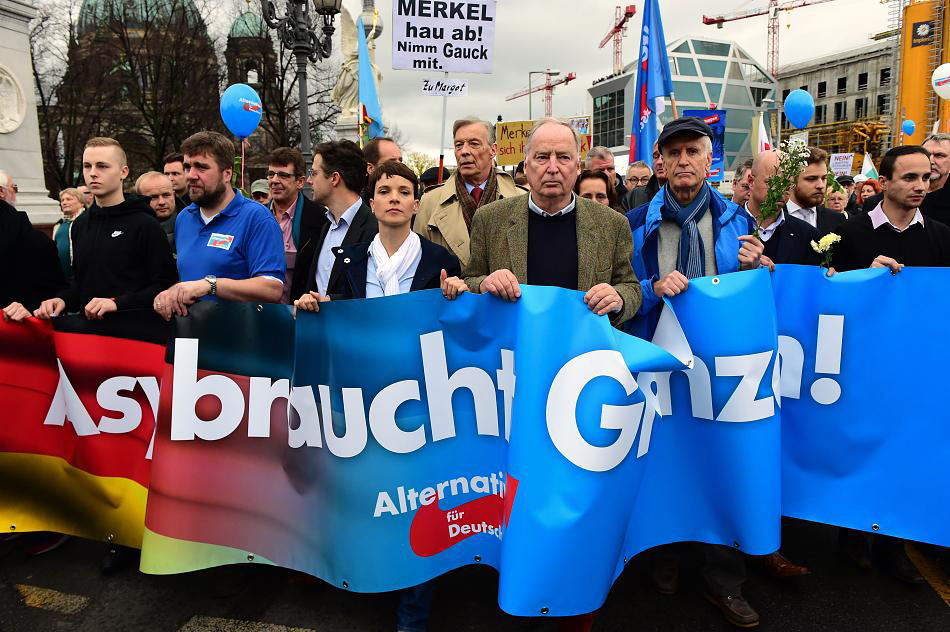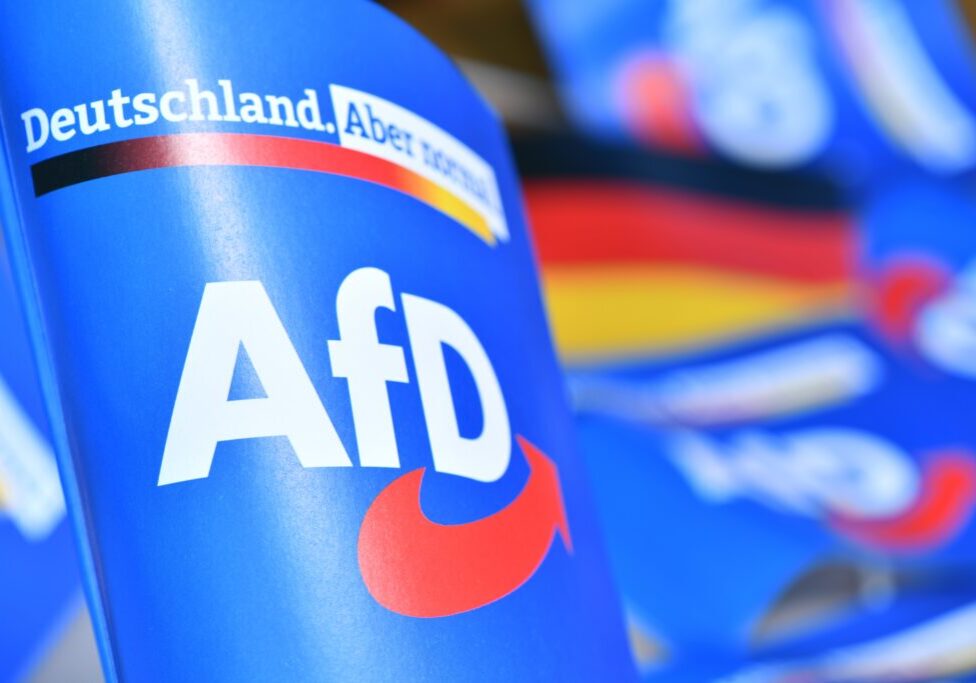Australia/Israel Review
Kulturkampf in Merkel’s Germany
Oct 3, 2017 | Dominic Green

The rise of the AfD
Angela Merkel and the alliance of her centre-right Christian Democratic Union (CDU) with the Bavarian social conservatives of the Christian Social Union (CSU) won the German federal elections on Sept. 24, granting Merkel her fourth consecutive term as chancellor. But that is not the real news out of the election.
Exit polls suggest that the dominant centre parties, the centre-right CDU and the centre-left Social Democrats (SDP), have lost ground since the 2013 elections, with the CDU-CSU alliance down to 33% from 41% and the SDP down to 20% from 25%.
This is a form of news, but it is not novel. The novelty lies in the rise of the anti-immigrant and anti-Islam nationalists of the Alternative für Deutschland (AfD) party, some of whose antecedents, attitudes, and followers evoke Germany’s historic alternatives to democracy.
In the 2013 elections, the AfD narrowly failed to cross the 5% threshold for representation in the Bundestag. On Sunday, it won 13.5% of the vote nationally, and more than 20% in the economically depressed areas of the old East Germany. The AfD will be the third-largest party in the new Bundestag, with up to 89 seats. This is the strongest showing by a new party since 1949.
Merkel’s CDU-CSU alliance, down from 311 to a projected 218 seats, will, as German governments usually do, form a coalition. The Social Democrats, down from 146 to 138 seats, might have continued in the post-2013 “grand coalition” with Merkel’s alliance, but following the election the SDP’s leader Martin Schulz declared his party to be the official opposition.
No one expected Merkel to lose power in these elections. The German economy is strong, and unemployment is low. The polls had Merkel comfortably in the lead from the start, and Merkel, unlike Theresa May in the British elections last June, did not bungle her advantage. The election campaign was positively dull – unenriched by controversy, financial scandal, or the close attentions of Vladimir Putin – and positive dullness has always been Merkel’s strong point.
Schulz of the Social Democrats, her nearest challenger, was dull too. He was also short on positive alternatives. This is not wholly attributable to his dullness, though he did burnish it to unreflective tedium in his years as an EU minister. Merkel, though she claimed that her party had achieved its “strategic goals” in the elections, is a tactical dullard. She possesses a gift for what Germany’s political scientists call “asymmetric demobilisation,” or, to put it more plainly, rendering even controversial issues dull.
When Schulz identified gay marriage as a potential vote-winner, Merkel neutralised the issue by putting it to a free vote in the Bundestag, and then abstaining. Merkel’s managerial triangulations lack the whiff of excitement that attended the fancy footwork of Bill Clinton and Tony Blair. Indeed, she soon regretted the most exciting moment of her chancellorship, the sudden admission of nearly 1 million unvetted and mostly Muslim migrants in the summer of 2015.
In the September 2016 state elections in Merkel’s home state of Mecklenburg-West Pomerania, the anti-immigrant AfD garnered 21% to push the CDU into third place, with a paltry 14%. In the Berlin state elections, the CDU gave its worst performance since 1945, falling out of the governing coalition with 18% of the vote.
After the 2016 state elections, the AfD had representatives in ten of Germany’s 16 state legislatures. Its rise, and its demonstrable success in drawing away CDU votes, forced Merkel to attempt an “asymmetric demobilisation.” Admitting a “bitter defeat,” and with her CSU allies demanding restrictions on migrant admissions, Merkel promised not to repeat the admission policy of 2015. “For some time, we didn’t have enough control,” she said. “No one wants a repeat of last year’s situation, including me.”
Before Sunday’s vote, the centrist parties, accurately understanding the threat from the AfD, had exhorted Germans to vote. Turnout rose by 5% on 2013’s figure, to 77%. Still, the AfD won 89 seats. This figure is almost identical to the number that Merkel’s alliance lost.
In her post-election acceptance speech, Merkel attributed the decline in her alliance’s share of the vote to the “extraordinary challenge” of the 2015 refugee crisis. The AfD’s success is an embarrassment to those Germans who hope that their country’s political culture has overcome their Nazi past – and an embarrassment to Merkel’s managerial style.
Sunday’s result does not mark the return of Nazism, though the AfD is the skinhead’s choice. But it does confirm that Europe’s culture war over immigration and Islam, and the intimately related issues of assimilation and terrorism, has arrived in the country that coined the phrase Kulturkampf.
It also suggests that some issues are too deep and difficult to be dulled as Merkel would prefer – and that Germany’s modern success as the master of the Eurozone does not render its society impervious to the stress tests of immigration and Islam. Even in affluent Germany, the centre ground is weakening and the fringe parties growing.
The AfD’s success makes it the first ultra-nationalist party to enter the Bundestag since 1960. In the former East German states, where the CDU-CSU alliance took 26.5% of the vote, the AfD reached 21.5%. The left-wing Die Linke came third with 16.5%, and the Social Democrats trailed in fourth place with 14.5%. Martin Schulz might have claimed the mantle of opposition in the Bundestag, but in the former East, the real opposition party is now the AfD. Schulz called Sunday, Sept. 24 “a bitter day for social democracy in Germany.”
“This is a great day for our party’s history,” said Alexander Gauland, the AfD’s top candidate. “We are entering the Bundestag for the first time. We’ll change the country.”
If so, the AfD will achieve its goals partially and indirectly. Merkel may, as she did after the 2016 state elections, triangulate toward tough restrictions on the intake of migrants, to stanch further losses of support to the AfD. The AfD may, like the Sweden Democrats in the Stockholm parliament, find themselves nullified by a cross-party boycott. They may even disintegrate on the threshold of the parliament, like Britain’s UKIP. They may well become a permanent fixture, pulling votes from both left and right like France’s National Front, and talking about law and order, and culture and language, not blood and soil.
Merkel says she is “confident” that she can form a “stable government.” This implies a coalition, not a minority government. There is talk of a “Jamaican coalition,” so-called because the parties’ colours are those of the Jamaican flag: black for the CDU-CSU, yellow for the free-market Free Democratic Party (FDP), and green for the Greens. Each of these parties took 60 seats. The structure of the “Jamaican coalition” will mean tension between the Greens and the Bavarian CSU. Merkel will have to work some “asymmetric demobilisation” to dull the antagonism of these unlikely allies.
Following the election, the Free Democrats and the Greens did not rule out a deal, but both named part of their price for participation. Both parties declared their opposition to French President Emmanuel Macron’s recent proposal, embraced by Merkel, to accelerate growth in the Eurozone, and accelerate the European Union’s growth into a single state, by instituting fiscal transfers between Eurozone member states.
If Merkel forms a coalition, she will have less room for manoeuvre than before. The 2013 coalition negotiations took 86 days. The first anti-AfD protests began even before all the votes had been counted. Merkel faces a long haul if she is to turn the Sept. 24 results into a stable government. More significantly, the AfD’s success represents a watershed in Germany’s post-war history. Will the great tactician find a strategic answer?
Dominic Green is the author of The Double Life Of Doctor Lopez and Armies Of God (Arrow). He teaches political science at Boston College and contributes to the Weekly Standard and New Criterion. © Weekly Standard (www.weeklystandard.com), reprinted by permission, all rights reserved.






